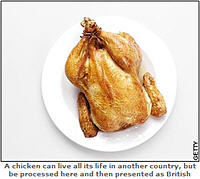



Not made in Britain
UK - It is Sunday afternoon. You have studied the food displayed on the supermarket shelves and made your selection. Price has probably been a factor but, for most shoppers, the primary consideration is quality. What we want is what we see on the packaging: a succulent steak, a pie that is puffed up to perfection, a cake that has the same light, springy texture as the one pictured on the wrapper. And, increasingly, we want to know where it came from. The majority of British shoppers prefer - what with the proliferation of diseases spread by edible animals - to buy British. If it claims to be an Aberdeen Angus steak, we'd like to feel reasonably reassured that it has more than just a nodding acquaintance with the breed. If it says Royal Oakham chicken, it would be nice to know that it has spent its life in or around a place called Oakham.
The majority of British shoppers prefer - what with the proliferation of diseases spread by edible animals - to buy British. If it claims to be an Aberdeen Angus steak, we'd like to feel reasonably reassured that it has more than just a nodding acquaintance with the breed. If it says Royal Oakham chicken, it would be nice to know that it has spent its life in or around a place called Oakham. A chicken can live all its life in another country, but be processed here and then presented as British
Yet the truth is that very few of us actually know exactly what we are eating and where it comes from. Did that salmon really swim up the River Dee? Were those Jersey Royals really from the soil of the Channel Islands or might they be a much cheaper Irish variety? And that Oakham chicken? Take a closer look at the small print on the packaging and it will reveal that while the product is made in this country, the meat is actually "chicken from farms in the UK and the EU". In fact, Marks & Spencer insists it is made with only British meat, in spite of what the label says. But it certainly isn't from Oakham. "There are several places called Oakham," says the store's spokeswoman. "It is just a name we gave to it. It is not meant to be meat from Oakham."
Source: By Richard Gray and Adam Lusher, Sunday Telegraph











